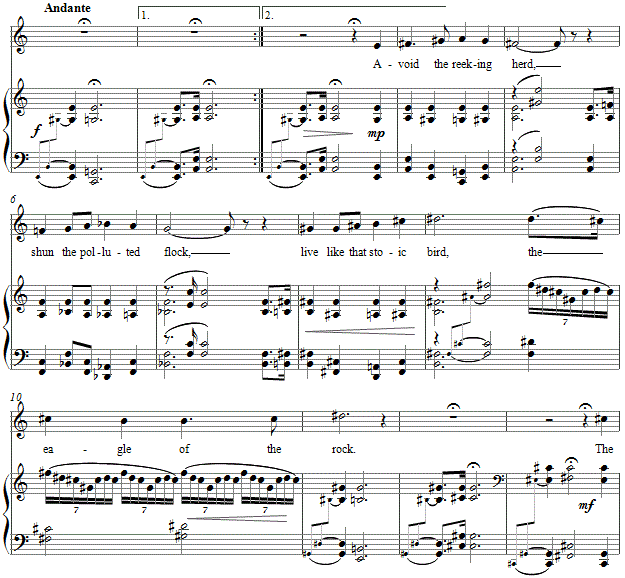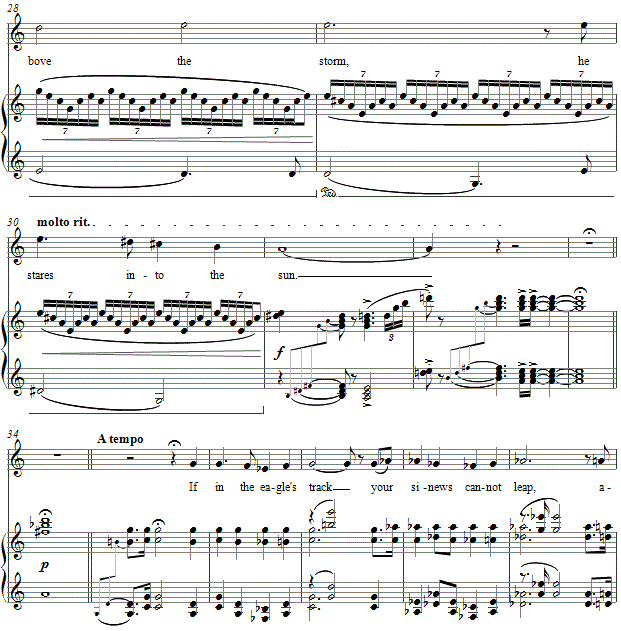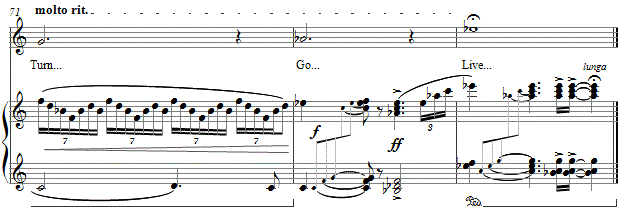Music and Texts of GARY BACHLUND
Vocal Music | Piano | Organ | Chamber Music | Orchestral | Articles and Commentary | Poems and Stories | Miscellany | FAQs
The Eagle and the Mole - (2012)
Elinor Wylie
for medium voice and piano
Avoid the reeking herd,
Shun the polluted flock,
Live like that stoic bird,
The eagle of the rock.
The huddled warmth of crowds
Begets and fosters hate;
He keeps above the clouds
His cliff inviolate.
When flocks are folded warm,
And herds to shelter run,
He sails above the storm,
He stares into the sun.
If in the eagle's track
Your sinews cannot leap,
Avoid the lathered pack,
Turn from the steaming sheep.
If you would keep your soul
From spotted sight or sound,
Live like the velvet mole:
Go burrow underground.
And there hold intercourse
With roots of trees and stones,
With rivers at their source,
And disembodied bones.5 pages, circa 4' 00"
Elinor Wylie
The text is s sermon, for so it seems to me. In the metaphors of eagle and mole, we are told that sometimes we must individually soar above and sometimes we must hide away as a defense against the "herd." [ 1 ] Many of the statements are imperatives in terms of grammar. Lets we find the suggestions odd, we might turn our minds to such words as Henry David Thoreau's "If a man loses pace with his companions, perhaps it is because he hears a different drummer. Let him step to the music which he hears, however measured, or far away." Or more modern phrases like "thinking outside the box" come to mind. Or "break the mold" as in, to be different than.
But more than being simply different from one's fellows, Wylie observes that "The huddled warmth of crowds / Begets and fosters hate." As one watches the anger and riots against so-called austerity in Greece and other European nations, one finds the promise of the social welfare state supported by increased borrowing to have been a "huddled warmth" for a time now turning to resentment and hate. One may similarly observe the earlier history of Europe in which unification -- under a Napoleon, Kaiser or the National Socialists and Italian fascists -- is now the political aim of the "modern" European Commission under whose watchful eye -- irony intended -- whole nations' unsustainable debt is rending society.
Wylie's text, which I suggest is a sermon most profound, reminds of Charles Mackay's extraordinary work from 1841 about the madness of crowds. Wylie's "reeking herd" and "lathered pack" speak of crowds acting in a unified delusion. This is a historical truth as one can recall the lessons of recent history, even to the rhetorical yet false constructions such as the United States' "fiscal cliff," Japan's "lost generation," or the "Arab spring" of riot-torn Egypt, civil war in Syria or the murderous repression of Christians today in some African Muslim nations. University of Hawaii Professor Emeritus Rummel's scholarly work on such a history is apt, and suggested another "sermon" set to music, Pray tell, my brother, why. The old joke before the Soviet Socialist USSR collapsed was a light-hearted view to the same subject and Wylie's advice: "I am working against the government -- by not working." The actuarial truth of this speaks volumes, as some American cities now undergo bankruptcy, as the "green energy" schemes of many nations collapse economically, and as more examples of what Mackay will tell us -- should we heed it -- the "madness of crowds" and of what Wylie tells us are the "polluted flock" and "steaming sheep" which accept such "madness" until they can no longer.
Wylie's text [ 2 ] is advice for those who would hear, then as for today.
The common-tone strategy underpins the gestures for a large part of the musical materials. E joins E major, C major and A without a third in the opening gesture, a hint that some things remain constant when the world's "madness" shifts about us, as the tonal domains shift from phrase to phrase.
The rustle of the right hand suggests the flight of wings, and later the flowing of waters. With the bright cadence at measure 33, what follows is a lessening and more dissonant pause, after which the "sermon" takes up again to reflect that not all many "soar" like the eagle. The musical rhetoric is restated in other tonal domains, still shifting against the common-tone which binds sense together.
The coda to this setting recalls the musical gesture of the eagle's soaring against the poetic image of "the sun." The imperative verbs reprise, telling to "turn, go, and live."
The score for The Eagle and the Mole is available as a free PDF download, though any major commercial performance or recording of the work is prohibited without prior arrangement with the composer. Click on the graphic below for this piano-vocal score.
NOTES
[ 1 ] Extraordinary Popular Delusions and the Madness of Crowds, Charles Mackay (1812-1889), London: Richard Bentley, 1841. With his chapter headings are quotes by authors and poets of his time, so apt for today that one must stand amazed at the perceptive acuity of such men. And yet as with so many lessons, when forgotten or suppressed society must again experience the same madness and the same folly again and again.
In one quote, Mackay cites Pope's brilliant observation as apt for today as can be imagined:
"At length corruption, like a general flood,
Did deluge all, and avarice creeping on,
Spread, like a low-born mist, and hid the sun.
Statesmen and patriots plied alike the stocks,
Peeress and butler shared alike the box;
And judges jobbed, and bishops bit the town,
And mighty dukes packed cards for half-a-crown:
Britain was sunk in lucre's sordid charms.
He observes, "In fact, it will be found in the history of every generation and race of men, that whenever a choice of belief between the "Wondrously False" and the "Wondrously True" is given to ignorance or prejudice, that their choice will be fixed upon the first, for the reason that it is most akin to their own nature. The great majority of mankind, and even of the wisest among us, are still in the condition of the sailor's mother--believing and disbelieving on the same grounds that she did--protesting against the flying fish, but cherishing the golden wheels. Thousands there are amongst us, who, rather than pin their faith in the one fish, would believe not only in the wheel of gold, but the chariot--not only in the chariot, but in the horses and the driver."
And later he writes, "Let us not, in the pride of our superior knowledge, turn with contempt from the follies of our predecessors. The study of the errors into which great minds have fallen in the pursuit of truth can never be un-instructive. As the man looks back to the days of his childhood and his youth, and recalls to his mind the strange notions and false opinions that swayed his actions at that time, that he may wonder at them, so should society, for its edification, look back to the opinions which governed the ages fled. He is but a superficial thinker who would despise and refuse to hear of them merely because they are absurd. No man is so wise but that he may learn some wisdom from his past errors, either of thought or action, and no society has made such advances as to be capable of no improvement from the retrospect of its past folly and credulity. And not only is such a study instructive: he who reads for amusement only, will find no chapter in the annals of the human mind more amusing than this. It opens out the whole realm of fiction--the wild, the fantastic, and the wonderful, and all the immense variety of things "that are not, and cannot be; but that have been imagined and believed."
Most importantly, he says to us today, "Men, it has been well said, think in herds; it will be seen that they go mad in herds, while they only recover their senses slowly, and one by one."
[ 2 ] The text is found in Wylie's collection, Nets to Catch the Wind, New York: Harcourt, Brace, 1921. The title of the collection is not represented in the collection itself as a title of an individual poem. What sort of net might we imagine be fabricated to "catch the wind?" Gossamer words catch age-old truths, I suggest.



